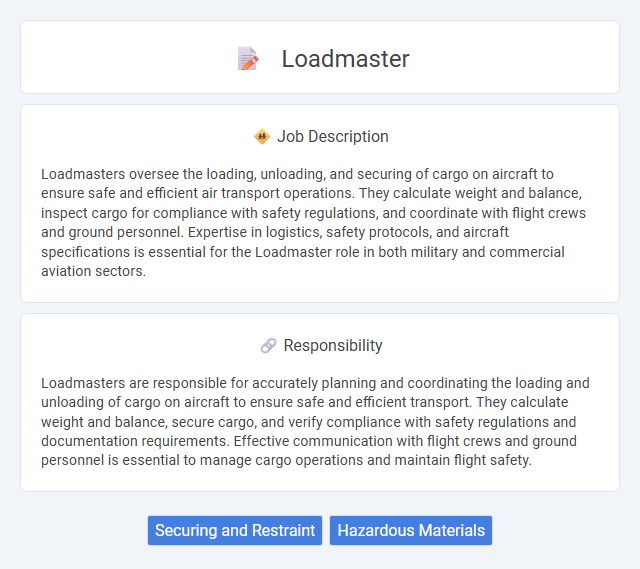
Loadmasters oversee the loading, unloading, and securing of cargo on aircraft to ensure safe and efficient air transport operations. They calculate weight and balance, inspect cargo for compliance with safety regulations, and coordinate with flight crews and ground personnel. Expertise in logistics, safety protocols, and aircraft specifications is essential for the Loadmaster role in both military and commercial aviation sectors.
Individuals with strong physical stamina and the ability to remain calm under pressure are likely suited for a Loadmaster role, as the job demands managing cargo loads and ensuring safety during flights. Those who thrive in dynamic environments and possess excellent organizational skills may find this occupation a good fit. Conversely, people prone to stress or lacking attention to detail might struggle with the responsibilities inherent in this position.
Qualification
Loadmasters must possess a strong understanding of cargo weight distribution, load planning, and safety regulations to ensure secure and efficient aircraft loading. Certification from recognized aviation authorities such as the Federal Aviation Administration (FAA) or equivalent international bodies is essential, along with comprehensive training in hazardous materials handling and emergency procedures. Practical experience in aviation logistics, combined with excellent communication skills and attention to detail, qualifies candidates for this critical role in air transport operations.
Responsibility
Loadmasters are responsible for accurately planning and coordinating the loading and unloading of cargo on aircraft to ensure safe and efficient transport. They calculate weight and balance, secure cargo, and verify compliance with safety regulations and documentation requirements. Effective communication with flight crews and ground personnel is essential to manage cargo operations and maintain flight safety.
Benefit
Loadmaster roles likely offer significant benefits such as enhanced career growth opportunities and competitive compensation packages. Many positions may provide access to specialized training and certifications, increasing long-term job security. Employees could also experience a dynamic work environment with potential travel benefits, making the role appealing to those seeking varied and rewarding experiences.
Challenge
The Loadmaster role likely presents complex challenges involving precise weight distribution and cargo securing to ensure flight safety. Navigating dynamic environments and adhering to strict regulatory standards could require quick decision-making under pressure. Problem-solving skills probably play a crucial role in overcoming unexpected loading issues and maintaining operational efficiency.
Career Advancement
Loadmasters play a critical role in coordinating cargo loading, weight distribution, and safety compliance for air transportation missions. Career advancement opportunities often include promotions to senior Loadmaster roles, supervisory positions, or specialized roles such as aerial delivery specialists and flight safety officers. Gaining certifications in hazardous materials handling and logistics management further enhances professional growth and leadership potential within aviation and defense industries.
Key Terms
Securing and Restraint
Loadmasters play a crucial role in securing and restraining cargo to ensure safe air transportation. They meticulously calculate weight distribution and use specialized restraint equipment such as nets, straps, and locks to prevent movement during flight. Proper cargo securing techniques minimize the risk of damage and enhance overall flight safety and efficiency.
Hazardous Materials
Loadmasters specializing in hazardous materials ensure the safe handling, loading, and transport of dangerous goods in compliance with international regulations such as IATA and IMDG codes. They conduct thorough risk assessments, verify proper labeling, and secure hazardous cargo to prevent spills, leaks, or accidents during air transport. Expertise in emergency procedures and communication protocols is critical to minimizing risks and protecting crew, aircraft, and the environment.
 kuljobs.com
kuljobs.com